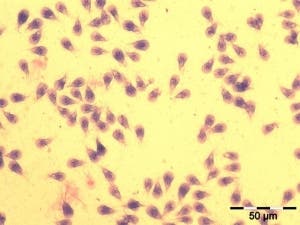Giardia in dogs and cats
Giardia is a single-celled microscopic protozoan parasite, not a worm, bacteria or virus. It lives in the intestines of animals including dogs, cats, and humans and causes the intestinal infection known as Giardiasis - which is actually one of the most common parasitic diseases in the world.
While Giardia can infect both dogs and cats, the strains that infect them are species-specific, meaning a dog infected with Giardia does not pose a risk to a healthy cat1.
How do pets get infected with Giardia?
Giardia is contracted through contaminated water, food or soil.
Once inside the dog or cat, it causes infected cells of the small intestine to rupture, releasing microscopic Giardia cysts into the animal's poo. These cysts can live for months in the environment, even in water, increasing the chances of other animals being infected.
Dogs and cats can also get infected by licking their paws or body after contact with contaminated surfaces.
Because Giardia can be transmitted to humans, it is possible for you to be infected too, but the majority of people get their infections from other humans instead of their animals.

Symptoms and diagnosis
Despite being present and sometimes harmless in the human gut, Giardia can cause real problems for your dog or cat. It is a very common cause of diarrhoea, especially in puppies and dogs that have spent any time in a shared kennel, as well as vomiting, weight loss and lethargy.
If your pet has any of these symptoms, it's important to get them to your vet as soon as possible. Your vet may take a fresh faecal (stool) sample for testing; if the sample includes cysts shed by the pet, this is an indication of Giardia. Because Giardia cysts can be shed intermittently in the stool, they might not be seen on a single stool sample.
Prevention and treatment
In most situations where Giardia infection is confirmed as the cause of illness, the vet will prescribe medication. The most commonly used treatments are the dewormer fenbendazole and the antibioic metronidazole. Follow up tests may be needed to ensure the infection is cleared.
To prevent your pet becoming reinfected with Giardia, or infecting other animals in the home, it's important to eliminate any remaining cysts in the pet's environment - so you'll need to
- bathe your pet regularly to remove any cysts caught on the fur
- disinfect your pet's water, food bowls and toys
- disinfect any surfaces that your pet has defecated on such as patio slabs
- try not to allow your dog to defecate on surfaces that can't be disinfected, such as grass and soil - Giardia cysts on the lawn can only be killed by direct sunlight drying them.
- be extra vigilant about where your pet drinks or eats
If you have another dog or a cat, ask your vet if they might need testing for Giardia, in case they are carriers and a potential source of infection.
There’s plenty you can do to cut down the chances of your dog becoming infected with Giardia:
- Make sure your dog has clean, safe drinking water at all times
- Do not allow your dog to drink communal water in public places
- Pick up and dispose of your dog’s poo immediately to prevent the spread of the parasite, taking care to wash your hands afterwards.
Finally, be mindful when your dog is socialising with other dogs in parks, kennels or grooming facilities, particularly where there are water sources present.
Did you know…
Actor and author David Walliams contracted giardiasis while swimming the length of the River Thames for charity.
